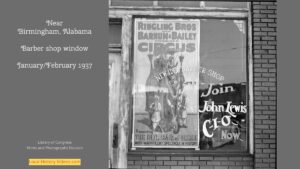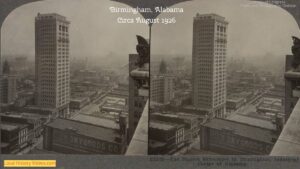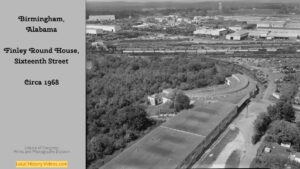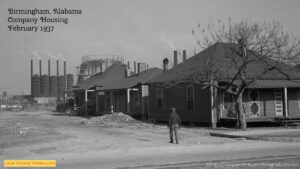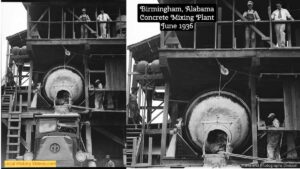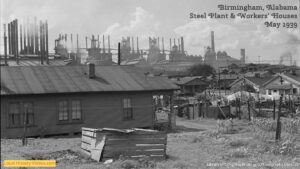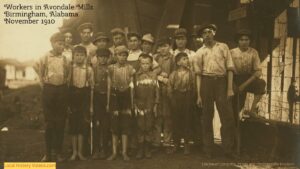Discover why steel was such an important part of the local economy in Birmingham, Alabama, USA.
Birmingham, Alabama, is historically significant for its steel production, which played a crucial role in the city’s economic development and industrial identity. The Birmingham region, known as the “Pittsburgh of the South,” was rich in the natural resources required for steel production, including coal, iron ore, and limestone. This abundance made it an ideal location for the establishment of steel mills.

The steel industry in Birmingham began to flourish in the late 19th century, with the founding of companies like the Alabama Steel and Iron Company in 1886. The city’s growth was fueled by the industrialization that accompanied the steel boom, attracting an influx of workers from various backgrounds. The production of steel was vital during significant historical periods, particularly during World War I and World War II, where steel was essential for military operations.
In 1900, U.S. Steel, one of the largest steel producers in the country, established a presence in Birmingham, further solidifying the area’s role in the steel industry.
The city quickly established itself as a steel production hub.

Major steel mills, including the Tennessee Coal, Iron and Railroad Company and the Birmingham Steel Corporation, contributed to the city’s reputation as a steel powerhouse.
Birmingham produced significant quantities of pig iron and steel, contributing to the demands of the domestic market during the two World Wars.
Sloss-Sheffield Steel and Iron Company

The Sloss-Sheffield Steel and Iron Company played a pivotal role in the industrial history of Birmingham, Alabama, particularly in the steel production sector. Established during the late 19th century, the company became one of the most prominent producers of iron and steel in the southern United States, significantly shaping the region’s economic landscape.
Founding and Early Years
The origins of the Sloss-Sheffield Steel and Iron Company trace back to the 1880s. The company was founded by James M. Sloss, a key figure in Birmingham’s industrial development, and initially started as the Sloss Iron and Steel Company in 1881. Sloss capitalized on the abundant natural resources in the Birmingham area, particularly the availability of coal, iron ore, and limestone, which were essential for steel production.
In 1901, the company merged with the Sheffield Steel Company, a smaller steel manufacturer, forming the Sloss-Sheffield Steel and Iron Company. This consolidation allowed the company to expand its operations and increase its production capacity, positioning it as a major player in the competitive steel market.
Operations and Production
The Sloss-Sheffield Steel and Iron Company operated several furnaces, primarily utilizing the Bessemer process for steel production, which was a revolutionary method for converting pig iron into steel efficiently. The company was known for producing high-quality steel products, including rails, bars, and structural steel, which were in high demand due to the rapid expansion of railroads and urban infrastructure in the late 19th and early 20th centuries.
The company’s facilities included a series of blast furnaces and mills located in Birmingham, which contributed significantly to the local economy and provided employment opportunities for thousands of workers. Sloss-Sheffield became one of the largest employers in the region, attracting a diverse workforce, including immigrants and African Americans, who played a crucial role in the company’s operations.
Labor Relations and Strikes
Like many industrial companies of the era, Sloss-Sheffield faced labor challenges, including difficult working conditions and demands for better wages and hours. Labor unions began to form, and tensions between management and workers occasionally erupted into strikes. One of the notable labor disputes occurred in 1919, reflecting broader labor movements in the country during that time.
Decline and Legacy

The mid-20th century brought challenges to the steel industry as competition increased from foreign steel producers and changes in technology began to impact traditional steelmaking operations.
By the 1970s, Sloss-Sheffield faced economic difficulties and ultimately ceased operations in 1971.
Despite its closure, the legacy of the Sloss-Sheffield Steel and Iron Company endures. The company’s former blast furnaces were preserved as the Sloss Furnaces National Historic Landmark, which was designated in 1981. This site is now a museum and cultural center, celebrating Birmingham’s industrial heritage and the significance of steel production in the city’s history.
In addition to its historical value, Sloss Furnaces serves as a venue for public events, educational programs, and artistic endeavors, highlighting the enduring impact of industrialization in Birmingham.
Birmingham’s Steelworkers

In the early years, Birmingham’s workforce included child labor, even in the steel industry. The state legislature enacted significant child welfare legislation between 1887 and 1919.
At its peak, Birmingham’s steelworks employed tens of thousands of workers, reflecting the city’s critical role in the industrial landscape of the American South. The workforce numbers fluctuated based on economic conditions and market demand, peaking during times of high production needs, particularly during the World Wars.
The steelworks not only employed thousands directly but also created numerous ancillary jobs in related fields, including transportation, maintenance, and manufacturing of steel products. The growth of the steel industry was a significant factor in Birmingham’s population increase during this period, as workers migrated to the city in search of job opportunities.
A Historic Legacy
Birmingham’s steel industry faced challenges in the late 20th century, including competition from foreign steel and changes in manufacturing processes. Many mills began to close in the 1970s and 1980s, leading to significant economic disruption in the area.
Despite the decline of traditional steel manufacturing, Birmingham has since diversified its economy, but the legacy of steel production remains a vital part of its identity. Today, Birmingham continues to honor its industrial past through various historical sites and museums, such as the Sloss Furnaces National Historic Landmark, which showcases the city’s steelmaking history.
More about Alabama
- Labor Rights in Old Birmingham, AlabamaThe labor movement in Birmingham, Alabama, has been a significant part of the city’s industrial history, characterized by a struggle for workers’ rights, labor organization, and social justice.
- Birmingham, Alabama in the 1930sStep back in time to 1930s Birmingham, Alabama, a vibrant city struggling with the impact of the Great Depresssion.
- Birmingham, Alabama in 1926By 1926, Birmingham, Ala., was at the height of its industrialization and a dynamic, modern place to be.
- The Finley Roundhouse at Birmingham, AlabamaThe Finley Roundhouse was an important part of railway history in Birmingham, Alabama. Abandoned and derelict, its roof was destroyed by a hurricane.
- Company Housing in Old Birmingham, AlabamaAs workers migrated into the expanding city of Birmingham, Alabama the company houses were in high demand.
- Making Concrete in Old Birmingham, AlabamaConcrete was an essential part of growing the city and industries of Birmingham, Alabama.
- The Steel Industry in Birmingham, AlabamaDiscover why steel was such an important part of the local economy in Birmingham, Alabama, USA. Birmingham, Alabama, is historically significant for its steel production, which played a crucial role in the city’s economic development and industrial identity. The Birmingham region, known as the “Pittsburgh of the South,” was rich in the natural resources required… Read more: The Steel Industry in Birmingham, Alabama
- Old Photos of the Workers of Mobile, AlabamaGlimpse history through old photos of adults and children at work in Mobile, Alabama, USA.
- The Child Workers of Birmingham, AlabamaDiscover the haunting old photos of children who worked in the factories, eateries, messaging and transportation industries of Birmingham, Alabama.
- Old Images of Mobile, AlabamaGlimpse history through old images of Mobile, in Alabama, USA.


